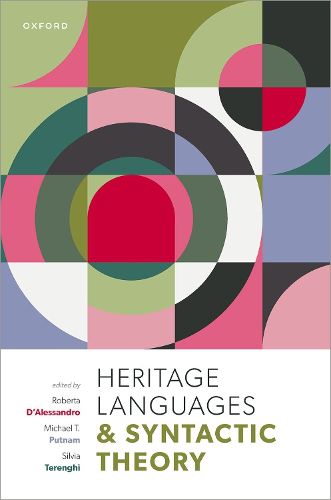Readings Newsletter
Become a Readings Member to make your shopping experience even easier.
Sign in or sign up for free!
You’re not far away from qualifying for FREE standard shipping within Australia
You’ve qualified for FREE standard shipping within Australia
The cart is loading…






This is an open access title available under the terms of a CC BY-NC-ND 4.0 International licence. It is free to read at Oxford Academic and offered as a free PDF download from OUP and selected open access locations.This volume explores a wide range of structural phenomena in typologically diverse heritage languages using current Minimalist theoretical approaches. Heritage languages have been the focus of extensive research in the last three decades; by virtue of their inherent diversity stemming from initial learning conditions, they pose significant challenges to traditional methods of linguistic description that rely on uniform conceptions of what 'knowledge of language' should be. Despite the existence of inter- and intra-speaker variation in the grammars of heritage languages, there are also significant shared development trends and structural outcomes that cannot be considered to be purely circumstantial. The studies presented in this volume illustrate the practicality and usefulness of subjecting domains of heritage language syntax to rigorous formal analysis. The chapters also have implications for theory-building efforts within the current Minimalist landscape; they force a reassessment of our understanding of the ideal speaker-hearer (Chomsky, 1965) in the context of bi- and multi-competent individuals and communities. In line with recent trends in contemporary Minimalism that largely eschew the notion of traditional parameters and an enriched view of Universal Grammar, the integration of heritage languages into syntactic theory adds an important piece of the puzzle relating to linguistic competence. The volume also in some respects calls for a re-evaluation of the prevailing stance that the syntax of heritage languages is predominantly immune to significant decay or change.
$9.00 standard shipping within Australia
FREE standard shipping within Australia for orders over $100.00
Express & International shipping calculated at checkout
This is an open access title available under the terms of a CC BY-NC-ND 4.0 International licence. It is free to read at Oxford Academic and offered as a free PDF download from OUP and selected open access locations.This volume explores a wide range of structural phenomena in typologically diverse heritage languages using current Minimalist theoretical approaches. Heritage languages have been the focus of extensive research in the last three decades; by virtue of their inherent diversity stemming from initial learning conditions, they pose significant challenges to traditional methods of linguistic description that rely on uniform conceptions of what 'knowledge of language' should be. Despite the existence of inter- and intra-speaker variation in the grammars of heritage languages, there are also significant shared development trends and structural outcomes that cannot be considered to be purely circumstantial. The studies presented in this volume illustrate the practicality and usefulness of subjecting domains of heritage language syntax to rigorous formal analysis. The chapters also have implications for theory-building efforts within the current Minimalist landscape; they force a reassessment of our understanding of the ideal speaker-hearer (Chomsky, 1965) in the context of bi- and multi-competent individuals and communities. In line with recent trends in contemporary Minimalism that largely eschew the notion of traditional parameters and an enriched view of Universal Grammar, the integration of heritage languages into syntactic theory adds an important piece of the puzzle relating to linguistic competence. The volume also in some respects calls for a re-evaluation of the prevailing stance that the syntax of heritage languages is predominantly immune to significant decay or change.